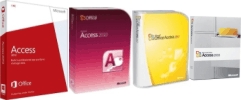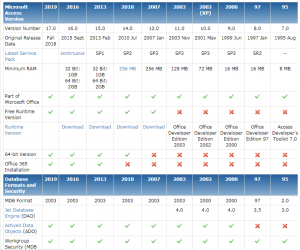 Microsoft Access debuted in 1992 and recently celebrated its 25th Anniversary! Over the decades, Microsoft Access evolved with a large number of enhancements, database formats, features both new and old. and discontinued features.
Microsoft Access debuted in 1992 and recently celebrated its 25th Anniversary! Over the decades, Microsoft Access evolved with a large number of enhancements, database formats, features both new and old. and discontinued features.
It’s hard to remember all the changes. Fortunately, we created a comparison matrix that shows the different Microsoft Access versions and changes. See when versions were released, their latest service packs, database formats, linked tables, field types, security features, Windows Operating Systems, and many other features both new and old.
Visit our page: Microsoft Access Version Features and Differences Comparison Matrix

 The recent release of Windows 7, Service Pack 1 (and Windows 2008 R2) breaks backward compatibility for Microsoft ActiveX Data Objects (ADO). That means if your .NET, Visual Basic 6, VBA/Office, C++ or other program includes an ADO library reference, and you compile your application or COM object on a Windows 7 SP1 machine, it will not run when deployed to an earlier environment containing the existing ADO object.
The recent release of Windows 7, Service Pack 1 (and Windows 2008 R2) breaks backward compatibility for Microsoft ActiveX Data Objects (ADO). That means if your .NET, Visual Basic 6, VBA/Office, C++ or other program includes an ADO library reference, and you compile your application or COM object on a Windows 7 SP1 machine, it will not run when deployed to an earlier environment containing the existing ADO object.